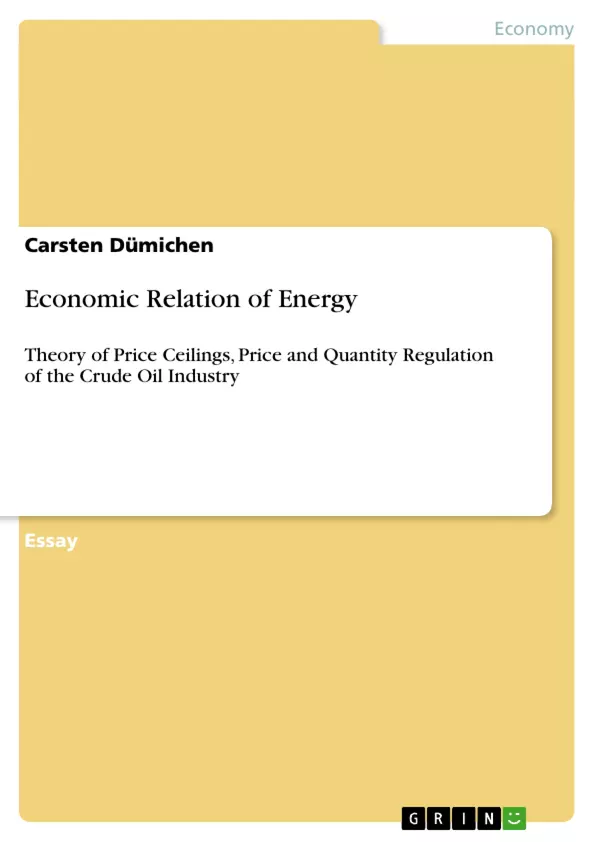The general market regulation involves direct government intervention in economic processes to achieve political goals or to correct market failures. Regulation can be implemented through guidelines, recommendations and laws. But a government-controlled influence of the price or quantity can affect the market equilibrium to which the government policies should not be aimed at. Hence it is of utmost importance that regulation in terms of subsidies, customs, price ceilings or lower price limits are used as careful as possible without neglecting the natural market forces primarily described by Adam Smith in his book "An Inquiry into the Nature and Causes of the Wealth of Nations" (1776).
Since people are trading they are always looking for ways to make good profit out of their goods and services. To protect their countries domestic production, governments put tolls on foreign products to reduce the imports of the latter and to support domestic products. But this import tax has a rather contradictory effect: For one the government anticipates a strong domestic production with everyone buying this product rather than a substitutable foreign product. Domestic production increases indeed, but an import tax raise the price of the domestic product and lowers the price of the foreign product. This means, an import toll is good for domestic producers (foreign consumers) but bad for domestic consumers (foreign producers). An import tax is one possibility to regulating the market. But this example raises the question of governmental goals, which need to be determined before a government enforces a regulation: Do we want to protect and promote consumers or producers?
Inhaltsverzeichnis (Table of Contents)
- Economic Relation of Energy
- Theory of Price Ceilings, Price and Quantity Regulation of the Crude Oil Industry
- Price and Quantity Regulation of the Crude Oil Industry
- OPEC
- Regulatory History
Zielsetzung und Themenschwerpunkte (Objectives and Key Themes)
This document analyzes the economic relationship of energy, focusing specifically on the theory of price ceilings and how they impact the price and quantity regulation of the crude oil industry. The text explores the historical development of the oil market, examining the role of OPEC and the regulatory measures implemented by governments, primarily the United States.
- The influence of price ceilings on market equilibrium and welfare.
- The economic impact of government intervention in the oil market.
- The historical development of the oil industry and the role of OPEC.
- The impact of global events and political instability on oil prices.
- The regulatory history of the oil industry, particularly in the United States.
Zusammenfassung der Kapitel (Chapter Summaries)
The first chapter delves into the theory of price ceilings, explaining how they affect market equilibrium and welfare. It examines the impact of price ceilings on consumers and producers, highlighting the potential for welfare loss and excess demand. The chapter emphasizes the importance of considering price elasticity of demand when evaluating the effectiveness of price ceilings.
The second chapter focuses on the price and quantity regulation of the crude oil industry, beginning with an overview of the industry's three major divisions: production, refining, and distribution. The chapter discusses the influence of major players in the oil market, including global oil companies, governments, and OPEC. It highlights the volatility of the oil market, influenced by economic cycles, price fluctuations, and political factors. The chapter concludes with a historical overview of the oil market, tracing the decline of U.S. dominance in oil production and the increasing dependence on foreign oil imports.
The final chapter explores the role of OPEC, tracing the organization's history from its founding in 1960 to its evolution into a powerful global cartel. The chapter examines OPEC's impact on the global oil market, particularly the oil price shocks of the 1970s. It also provides a historical overview of regulatory efforts by governments, primarily the United States, to influence the oil market.
Schlüsselwörter (Keywords)
This work focuses on the economic regulation of energy, particularly the crude oil industry. Key themes include price ceilings, market equilibrium, welfare, OPEC, oil price volatility, global oil markets, and government intervention in the oil market.
Frequently Asked Questions
What is the impact of price ceilings on the oil market?
Price ceilings can disrupt market equilibrium, potentially leading to welfare loss and excess demand where consumers want more than producers provide.
What role does OPEC play in global energy economics?
OPEC acts as a powerful global cartel that can influence oil prices and quantities through coordinated production levels among its member nations.
How do import taxes (tolls) affect domestic production?
Import taxes protect domestic producers by making foreign products more expensive, but they also raise prices for domestic consumers.
Why do governments intervene in the energy market?
Intervention is often aimed at achieving political goals, protecting domestic industries, or correcting market failures through subsidies, customs, or price limits.
What are the three major divisions of the crude oil industry?
The industry is divided into production, refining, and distribution.
- Citar trabajo
- Carsten Dümichen (Autor), 2011, Economic Relation of Energy, Múnich, GRIN Verlag, https://www.grin.com/document/203745



